|
 

Tractate 3 : The Error of Boethius (continued)
Determinism:
Present day perception:
When the doctrine holds that not only man’s eventual disposition but every event of his life is predestined, the position is identical to a special kind of determinism (Dictionary of Philosophy and Religion, William L. Reese, 1980.)
Within an Aristotelian system, the statement is absolute not only in terms of what it implies but in terms of what it so succinctly states. As such, no more need be said regarding present day perceptions of determinism.
The new perception:
To best understand the concept of determinism as it applies to a perception of singular location composed of subsets, a diagram once again will be the best manner to initiate the discussion. This diagram may look familiar, as it well should by now, but the dialogue boxes are now filled with the four forms of action:
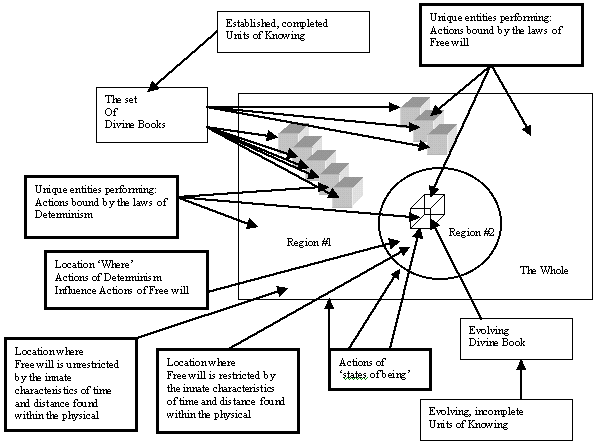
Now what is the difference between regions #1 and #2 in terms of determinism?
Region #2:
Within this region, within the region of the physical universe, actions bound by the laws of nature, actions which are subject to the laws of nature, actions observed and measured through the fields of science: physics, genetics, chemistry, etc.
Within this region, free will may operate but it does not operate unaffected by the laws of nature.
Region #1;
Within this region, within the region of pure abstraction, actions bound by the laws of nature are not found. As such, entities found ‘within’ this region have a much greater degree of potential acts they can ‘perform’ but the trade off is: They are unable to ‘experience’ ‘originally’. Even though ‘free will exists within this region, no unique, no original ‘change’ takes place because ‘unique change’ is a function of time and time is a function of the sub-entities rather than being a function of the whole.
In this section of the tractate, we have been giving a cursory examination to the concepts of divine foreknowledge, pre-destination, predestination, and determinism. One should note, that the concept of ‘free will’ has now been added to the equation. What of ‘free will’, does it change in terms of a ‘new perception’ as opposed to ‘present day perception’? Absolutely, a perceptual change in our understanding of free will is where the heart and soul of this tractate lies. The understanding of a concept such as free will cannot be expressed in ‘a’ paragraph but rather takes a complete tractate to accomplish. The totality of this tractate is where a new understanding of free will lies.
With this in mind, we need to examine the concept of free will in detail. Before we do, however, let’s examine the concept of determinism in a little more detail.
Internationality: the need ‘for’ a location of determinism
Actions bound by the laws of determinism: What ‘has been’
Actions bound by the laws of determinism are active ‘knowing’ actions taken by a ‘knowing’ entity and are independent of the laws of nature. Actions of determinism are actions generated by a ‘knowing’ entity whose intended actions are to over-ride actions of free will generated by a second ‘knowing’ entity. Examples of actions bound by the laws of determinism are: I am, against my will, pushed off the cliff by an entity itself bound by the laws of free will.
Actions bound by the laws of determinism tend to establish ‘gods’ and ‘God’. What is the difference between ‘gods’ and ‘God’? ‘gods’ are ‘beings’, physical essences, ‘higher order’ ‘beings’ while God is an abstractual essence, ‘higher order’ ‘Being’.
‘beings’ versus ‘Being’, what is the difference? In the sense of the four actions identified by metaphysics, nothing.
However, isn’t there a difference of degree? Actually, there is no difference of degree. The action of overriding the free will of an entity is the action of overriding the free will of an entity. Isn’t there a form of overriding the free will of an entity, which the entity in turn can overcome? If the entity whose freewill is being overridden manages to overcome the action of ‘gods’ or God and thus maintains its actions bound by the laws of free will, manages to maintain its desired course as originally intended, then its free will has not been overridden. As such, free will becomes the dominant action and determinism, although it remains an issue, becomes the recessive action.
Wouldn’t an entity whose free will has been impacted by a ‘god’ or ‘God’ in an attempt to override the entity’s free will, find its intended actions altered by those very attempts to override its initial actions in the first place? Certainly. Wouldn’t such alterations be a form of ‘overriding’ the purity of action attempted by the entity attempting to initiate actions bound by the laws of free will? Absolutely. The degree of purity initiated by entities attempting to maintain their free will as well as the purity of actions initiated by entities of free will is not the issue here. Such concepts are discussions regarding what we call principles and issues regarding ‘standing up for one’s principles’.
With this having been said, we can now examine what actions bound by the laws of determinism really are. Such an examination brings us back to the four forms of action:
- The state of being
- Actions bound by the laws of nature
- Actions bound by the laws of free will
- Actins bound by the laws of determinism
Do not loose sight of the fact that within this tractate, the order given for the four forms of action in no way implies relative significance of one form of action over another. It may be too difficult to subconsciously overlook such a natural tendency without a little help. To assist us in recognizing the equality regarding all forms of action, lets restate the four forms of action and then proceed:
- Actins bound by the laws of determinism
- Actions bound by the laws of nature
- The state of being
- Actions bound by the laws of free will
Through the aid of the concept of ‘location’, we can begin to examine the four forms of action:
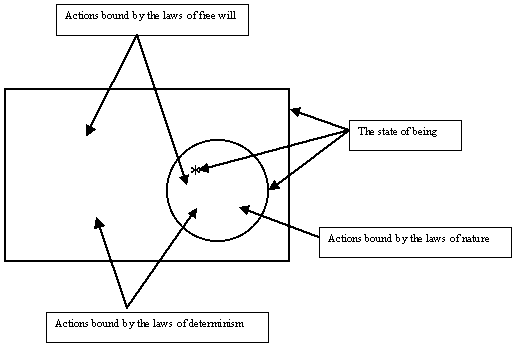
With this diagram in mind, lets re-categorize our four forms of action:
Forms of determinism:
1. Actions bound by the laws of nature
2. Actions bound by the laws of determinism
3. States of being
Forms of free will:
We have little difficulty acknowledging ‘the state of being’ exists.
We have little difficulty acknowledging, ‘actions bound by the laws of nature’ exist.
We have little difficulty acknowledging, ‘actions bound by the laws of determinism’ exist.
We do, however, have a problem understanding forms of free will. For the time being, we are going to set free will aside and focus upon the other three forms of action.
As such our previous diagram now becomes:
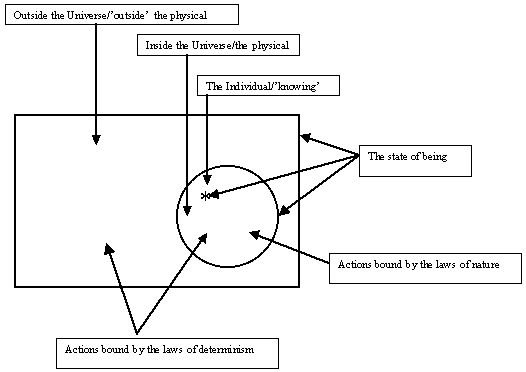
Earthquakes, volcanoes, waves, wind, starlight, gravitational pull, etc. are all forms actions bound by the laws of nature. These actions are, in present day society, perceived as neutral actions but actions nevertheless. They are perceived as actions, which affect entities of ‘knowing’. For the most part, however, they are actions whose pre-existing laws we, entities of knowing, find affecting ourselves in a neutral manner. These forms of actions originate in response to the ‘laws’ of nature and are not ‘initiated’ in a conscious manner planned by the natural entity of the mountain, the star, the ocean, the atmosphere.
I am, you are, the mountain is, the lake is, the house is, the tree is, etc, are all forms of actions represented by the passive action: the state of being. These actions are in present day society, perceived as neutral actions but actions nevertheless. They are perceived as actions, which effect entities of ‘knowing’, but for the most part, are actions whose pre-existing laws we exist ‘within’ rather than being actions unit entities intentionally, ‘knowingly’, willingly, and consciously initiate in a physical sense.
Murder, rape, verbal-abuse, genocide, physical assault, etc are, from the perspective of the victum, all forms of actions bound by the laws of determinism since the actions are not ‘controlled’ by the victim. These action, are in present day society, perceived as aggressive actions, forms of action. They are perceived as actions, which affect entities of ‘knowing’. Such actions are actions the entity does not ‘wish’ to have forced upon it. In the pragmatic sense, there is little arguing such actions occur within the physical, but what of such actions existing outside the physical? Outside the physical ‘actions bound by the laws of determinism’ do not exist for to exist and be ‘effective’ in an ‘affective’ manner actions bound by the laws of determinism must have a medium of action. Such a median is the physical itself. Without the physical, abstraction as well as any entity of pure abstractual existence need not submit to unsolicited actions of other purely abstractual existence.
With this in mind, we can examine the concept of divine foreknowledge as ‘the’ ultimate form of action bound by the laws of determinism. Abstractual existence is what determinism lies ‘within’ and the abstract is the means and the location within which established consciousness, ‘being’ itself, exists timelessly and within which established consciousness, ‘being’, understands its very timelessness.
When observing human behavior and interactions, it becomes obvious where free will does not lie. While free will may lie not only within actions bound by the laws of nature, and within actions bound by the laws of determinism, and within actions bound as states of being, free will in the purest sense lies ‘within’ itself, within the entity itself.
With this in mind, we come to the concept of free will itself:
Potentiality: the need ‘for’ a location of free will
It is the ‘entity’, which ‘performs’ the action not the ‘region’. Thus, the previous diagram needs to be expanded to include ‘entities’ within the abstract, to include units of knowing of what is uniquely perceived and uniquely experienced. As such, the diagram becomes:
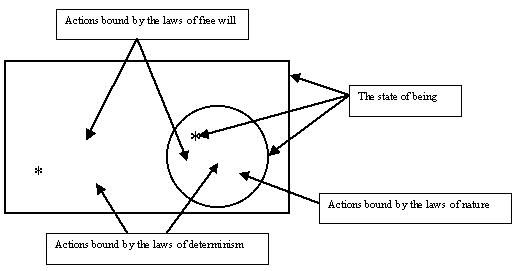
Now we are ready to discuss the issue of free will and determinism existing simultaneously in two versus one location.
The potential ‘to be’, action bound by the laws of free will, tends to establish self preservation as ‘the’ ultimate form of action since the physical existence is what free will lies ‘within’ and since the physical is the means by which and the location within which virgin consciousness, ‘being’ itself, emerges and expands its very self.
Action bound by the laws of free will is not an ‘absolute’, rather action bund by the laws of free will are actions that we ‘perceive to be occurring’:
Perceive to be occurring:
This state, the passive sandwiched between states of the active, replicates a dynamic metaphysical systems as opposed to static metaphysical systems
Dynamic metaphysical system: ‘being’ being ‘Being’

So why is this a ‘dynamic’ metaphysical system? It is dynamic because it provides a means for ‘growth’. All is ‘known’ except ‘what is to be’.
Static metaphysical system:

So why is this a ‘static’ metaphysical system? It is static because it provides no means for ‘growth’. All is ‘known’.
With this in mind, once again we come back to:
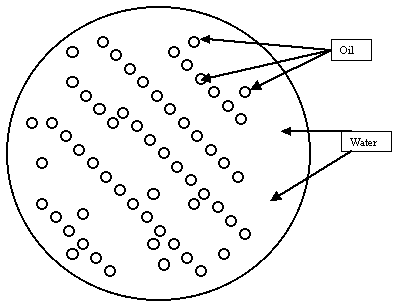
We will now dissolve the confinement of the border in order to remove the confusion of oil having an affinity to its container. As such, we obtain

We then create ‘a’ system by adding a boundary, which has no affinity for either oil or water. We do so simply for convenience. We thus obtain:
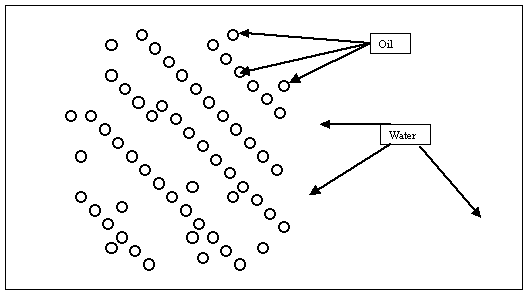
We then call oil by its correct symbolic name and do the same for water.
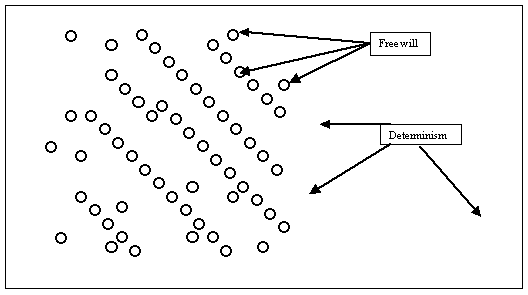
We then simplify using Ockham’s razor:

If we then create a ‘location for free will to function within a realm of space and time, we then obtain
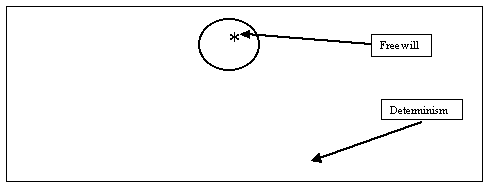
Once again we come back to the model of ‘being’ being ‘Being’.
Nothing: the need ‘for’ a location of nothing
We have discussed the concepts regarding the existence of free will and the existence of ‘divine foreknowledge’. We have discussed the concepts regarding a ‘location’ for free will and a ‘location’ for ‘divine foreknowledge’. The natural extension of such dialectic would appear to move into the direction of examining the existence of ‘nothingness’ and the ‘location’ for ‘nothingness’.
To move into the direction of such a discussion, however, would deprive us of completing the task at hand. The task at hand is finalizing our understanding as to how we can reasonably and rationally resolve the paradox regarding the simultaneous existence of ‘free will’ and ‘divine foreknowledge’.
The issue regarding ‘nothingness’ is extremely important and is not to be ignored. As such, the examination of ‘nothingness’ will be examined in the Tractate 4: Copernicus. Why discuss the issue of ‘nothingness’ within the Tractate 4: Copernicus? We will examine the concept of ‘nothingness’ within the Copernicus Tractate because it is Copernicus who unwittingly led us away from understanding nothingness itself.
The Book of Divine Foreknowledge:
Boethius’ system introduces us to the Book of Divine Foreknowledge:
Hidden deep within the ‘Book’ is free will
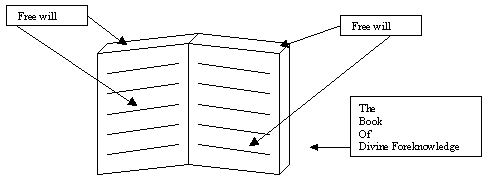
Within the book, one is free to make choices of their own preference but the choices are already ‘known’ by the ultimate Knowing, ‘known’ by ‘Omniscience’.
Religions would suggest the book is a form of encyclopedia of the whole; the book is a source of all knowledge.
If the book is a source of all knowledge, then Boethius is correct in his assumptions regarding the limits of men. If such is the case, then humanity can perceive of paradoxes whose solutions will never be know to humanity due to the limits ‘placed’ upon humanity not by itself but rather due to limits ‘placed’ upon humanity by a ‘superior’ Being.
If we find a means of resolving the contradicting paradox regarding the simultaneous existence of divine foreknowledge and free will, then we will, for the present, have removed the limits humanity places upon itself. If we can find an alternative solution to Boethius principle relegating humanity to a ‘limited’ status, then we will be ready to move on and free philosophy and metaphysics of its present constraints, thus opening the doors of not only truly new and exciting philosophical and metaphysical perceptual developments but we will have opened the doors of truly new and exciting cosmological and ontological perceptual developments as well.
This then leaves us with discussing the remaining two possibilities:
Which came first the chicken or the egg?
Which came first determinism or free will?
This question is very similar to the question, which surfaced in Tractate 1: Zeno and Seamlessness. In this Tractate, the question arose: Does the abstract exist ‘within’ the physical or does the physical ‘exist’ within the abstract?
The Location of Free Will:
Perceived ‘free will’ located ‘within’ the physical:
We understand free will to apply to active forms of actions. Previously we categorized actions into two forms:
Forms of action:
Passive:
1. State of being
2. Actions bound by the laws of nature
Active:
3. Actions bound by the laws of free will
4. Actions bound by the laws of determinism
Since the two forms of actions: states of being and actions bound by the laws of nature are actions we do not perceive as being actions generated by forms of consciousness, we will set them aside and concentrate upon the other forms of action, free will and determinism.
Free will ‘within’ the physical:
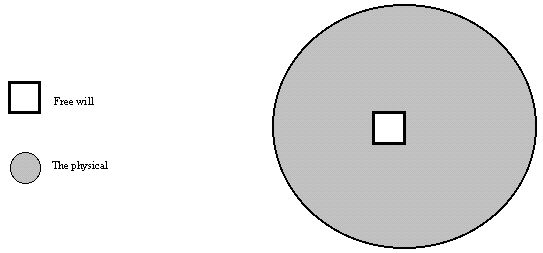
And it is within the physical we perceive abstraction to exist. Love, hate, jealousy, joy, awe, inspiration, knowledge, consciousness of consciousness, ….
But what of:
Free will ‘within the abstract
Since free will is an abstract concept we will use the same geometric configuration to represent abstraction:

If free will is to be free will, the individual must be the individual and as such, multiplicity becomes:
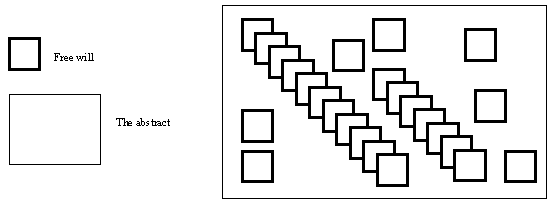
So it is, we come back again to the whole being the sum of its parts yet being the whole, having its own distinct identity. Thus giving rise, once again, to our understanding that in this type of metaphysical perception the whole is ‘greater’ than the sum of its parts.
The parts are original entities of ‘knowing’ having experienced originally within the physical. As such, it is more accurate to portray the latter diagram as:
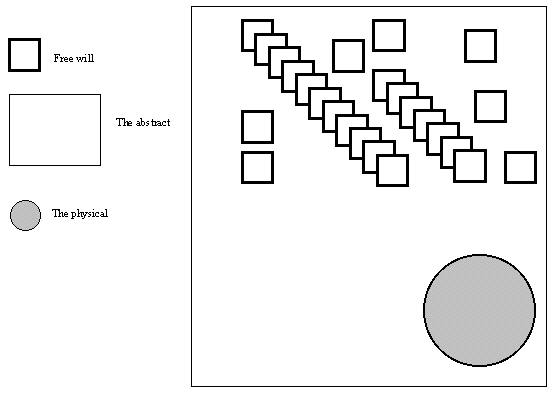
Where then is free will found in relation to the physical? It is found ‘within’ the physical just as it is found ‘within’ the abstract. As such, we obtain:
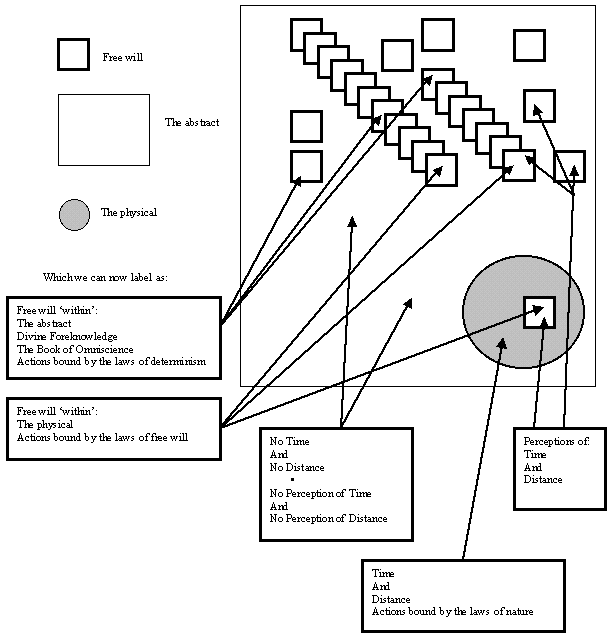
And what of the passive actions categorized as: states of being? These actions are represented by the black boundary lines of the three forms of action symbolized by the small square, the circle, and the large rectangle.
The location of Determinism:
The large rectangle:
The latter diagram defines the location of determinism. Determinism is found in the whole, the large rectangle.
Entities of ‘knowing’ can travel ‘within’ the whole as they so choose and experience everything including all abstractions they so desire to experience for they are no longer confined by the restraints of time and distance. ‘Knowing’ of all entities is open to all to experience for the abstract cannot be hidden from the abstract.
The whole is the whole and is ‘knowing’ of its wholeness. So it is the whole is the sum of all its parts in addition to being an entity in and of itself.
The whole grows with the growth of virgin ‘knowing’ and this ‘new’ ‘knowing’ adds to the whole.
Sequentiality is not an issue of the whole, for sequentiality is a function of time and distance and since time and distance are not an innate characteristic of the whole of abstraction, ordinal sequentiality are not innate characteristics of the whole.
Both the whole and the individual entities of ‘knowing’ are incapable of awareness of what is not and what is not is what ‘virgin knowing’ is to become through free will.
The circle:
The latter diagram defines the location of determinism. Determinism is found in the physical, the circle, both through actions bound by the laws of nature and actions bound by the laws of determinism.
The square:
The latter diagram defines the location where determinism is not. Determinism is not found in the square. Determinism is not found ‘within’ free will.
The misnomer of ‘free will’
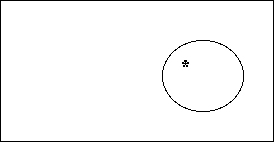
If ‘free will’ was established as action independent the action of determinism then is free will really ‘free will’ or just another form of determinism? If such were the case, then free will would have been established by determinism and thus free will would have been established through the act of determinism. If free will is found within determinism then was free will established ‘after’ the fact of determinism’s existence?
On the other hand, perhaps ‘free will’ void determinism initiated determinism. Perhaps determinism was established as a ‘storage’ location for free will.
At this point in time, it cannot be determined which of the two, free will or determinism, came first. Nor would it seem, are we capable of determining if neither is the case. We are presently incapable of determining if one came before the other or if the two ‘came’ into existence simultaneously.
In actuality, the three options regarding which came first, free will, determinism, or both simultaneously, are not as impossible to discuss as one might think.
The third choice:
Simultaneous emergence of free will and determinism would suggest an existence before either form of ‘active action’, determinism or free will, existed. But is it possible for there to be a from of action, other than either passive action or active action. Is it possible for there to be a form of action other than the four forms of action we discussed: States of being, actions bound by the laws of nature, actions bound by the laws of determinism, and actions bound by the laws of free will?
If one wishes to proceed with such an argument one must be able to describe such action in order for this dialectic to proceed. . In the absence of such a description, we will let the possibility of such a possibility stand but we will ignore the dialectic of such a possibility until the description of some form of action, other than passive or active action, emerges. Having set such a possibility aside, we should then proceed with the dialectic
A point of information: This work regarding The War and Peace of a New Metaphysical Perception will not ignore the argument: what came ‘before’ free will and determinism. The immersion into this very concept initiates the totality of the last chapter: Chapter 18: The End of the Beginning – Theoretical Metaphysics.
This then leaves us with discussing the remaining two possibilities:
Which came first the chicken or the egg?
Which came first determinism or free will?
This question is, in essence, no different from the question, which surfaced in Tractate 1: Zeno and Seamlessness. In this Tractate, the question arose: Does the abstract exist ‘within’ the physical or does the physical ‘exist’ within the abstract? One may refer to Tractate 1 if one chooses but rather than reiterate what came before, it is time to begin to address a summary of the issue of free will versus determinism.
It appears an extraordinary number of concepts will be addressed in the manner of ‘refer to what was previously…’ or addressed as ‘later we will…’. Unfortunately, this is a correct observation. Space and time are both limited by the concept known as a ‘Tractate’. It is the concept of space and time, which confines us to the parameter of limited discussions. It is the concept of ‘’tractate’, which limits us to staying on task rather than chaotically diverting our attention away from the discussion at hand, which is understanding how it is we became confined, caged, in the first place. It is only through understanding the concept of how it is we are ‘caged’ by limitations of creative understanding, that we can begin to explore the means of unlocking the door of our cage and stepping ‘out’ into the realm of free space once again.
Part of unlocking the door to this cage of philosophical confinement lies in exploding the perception of Boethius:
‘It is not allowed to man to comprehend in thought all the ways of the divine work.’ (Boethius: The Consolation of Philosophy, IV, 6)
Perceptions generated by Boethius lead to slamming shut the doors of perceptual ‘knowing’ and locking it shut. Free will lies behind the door labled: ‘It is not for us to know.‘lead to multiple perceptions such as: ‘If man were intended to fly, God would have given him wings.’
The misnomer regarding free will lies in the perception : Some people think free will is never interrupted or superceded. But as we have seen, there are two forms of action which often interfere with free will:
Actions bound by the laws of nature often supercede the desire to accomplish the actions bound by the laws of free will.
Actions bound by the laws of determinism often supercede the desire to accomplish actions bound by the laws of free will.
The ultimate extreme of both forms of action, actions bound by the laws of nature and actions bound by the laws of determinism, is exemplified as action which terminates actions bound by the laws of free will found within individual entities existing through action bound by the laws of the state of being.
Letting go
It is time for us to let go of Boethius’ metaphysical system. Previously we could not let go of Boethius’ perceptions because we had nothing to fill the vacuum ‘letting go’ would create. We could not let go of the concept:
‘The point of greatest importance here is this: the superior manner of knowledge includes the inferior, but it is quite impossible for the inferior to rise to the superior.’…
It is now time to let go of such perceptions. We have an alternative set before us regarding a perception of free will and determinism. We have an alternative which provides the means of ‘letting go’ the concept that it is humanity who defines what it is we cannot ‘know’. It is time to file Boethius’ concept regarding the ‘limits’ of humanity, the limits of ‘beings’ found within the universe, away as a part of the annals of history:
We come to the first paragraph of this Tractate:
Free will confined within the boundaries of determinism is simply an illusion of free will.
‘There can be little question that Boethius, more than any other philosophic author, helped the great Schoolmen to retain a general comprehensive view of the world as a whole, in spite of the distractions of their minute inquiries. ’ (Boethius, The Consolation of Philosophy, Penguin Books, 1969, England, Victor Watts, Merton College, Oxford.)
At this point in time, philosophers have not resolved the issue. On the other hand, at this point in time, philosophers have refused to embrace the rationality of a ‘whole’ enveloping the physical. As time has demonstrated, two and a half millennium of time, we cannot resolve some of our greatest philosophical paradoxes without the use of both the rationality and the reasonableness of such concept.
Until philosophy moves to the level of accepting its primary tool, reason, as being itself a legitimate tool , the paradoxes will remain paradoxes. Is the lack of being able to resolve the major paradoxes addressed within the Tractates of the work, The War and Peach of a New Metaphysical Perception, a negative? It is only a negative if one believes stagnation is a negative.
Why is it a ‘negative’ action to take the position: It is unimportant to resolve the issue of free will versus divine foreknowledge. Why is clinging to the concept that the relationship between free will and divine foreknowledge found within Boethius’ paradox a negative? Why is refusing to face perhaps one of the most influential paradoxes to confront us for the last twenty-five hundred years a potential negative? The answer to all these questions lies in our abhorrence toward the concept that we are a stagnant specie.
We have addressed three forms of paradoxes: Tractate 1: seamlessness versus multiplicity, Tractate 2: one first truth versus multiple first truths, and now Tractate 3: free will versus divine foreknowledge. In each instance it has been argued that we can resolve the paradox through themeans of expanding our perceptual understanding reason, metaphysics, philosophy, can provide.
In the past, we have been unable to resolve many philosophical paradoxes because the greatest paradoxes deal with abstractions and abstractions are not ‘physical’ in nature. As such, these paradoxes are not measurable for they are not items characterized by time and space.
Abstractions are capable of comprehending time and space but time and space are not capable of comprehending abstractions.
To resolve abstractual paradoxes embracing characteristics of time and space, one presently has only the tool of reason at one’s disposal.
Until we resolve the major paradoxes encompassing the interrelationships of the abstractual and the physical, the paradoxes will remain. The negative aspect of a state of stagnation is the state within which such a state leaves us, units of knowing. We remain mired at an established level of understanding.
Are there other levels of understanding awaiting us? Indubitably, and we, you and I, you and I together, will be left wanting in terms of rising to this new level of understanding until we find the means of resolving the primitive paradoxes presently facing us.
So what next? One thing is certain; we have not come to the end of our understanding regarding the issues of great paradoxes facing humanity. Our next step is to step ‘out’ beyond the issue of space itself.
It must be stated at this point that such a statement is a misconception for we cannot step ‘out’ beyond a region of infinite space. As we shall see in Tractate 4: Copernicus, we can only step ‘into’ a realm of infinite space and as we shall see, it is only by confining ourselves that we can free ourselves of confinement.
So it is free will may very well not be found ‘within’ ‘the’ System ‘ but rather free will may very well be found ‘within’ ‘a’ system ‘itself ‘contained’ ‘within’ a ‘greater’ System.
Are we creating a paradox? It is only a paradox if one does not understand the solution to the paradox Copernicus espoused the paradox of Centricism versus non-Centricism.
We now understand that:
Boethius is a vital link in moving our perceptual understanding forward regarding the ‘system’ being filled with determinism, into that of being ‘the’ system filled with both determinism and free will. As such, both free will and determinism, with the help of Boethius, now have a location within which each dominates. As such, the understanding regarding the role of free will and determinism as well as the understanding regarding the interrelationship between free will and determinism no longer remain in a state of confusion. Even more interestingly, the existence of such an interrelationship is not only recognized as a significant aspect of the ‘larger’ system but it is now understood how free will and determinism interact one with the other
|
|
|





















